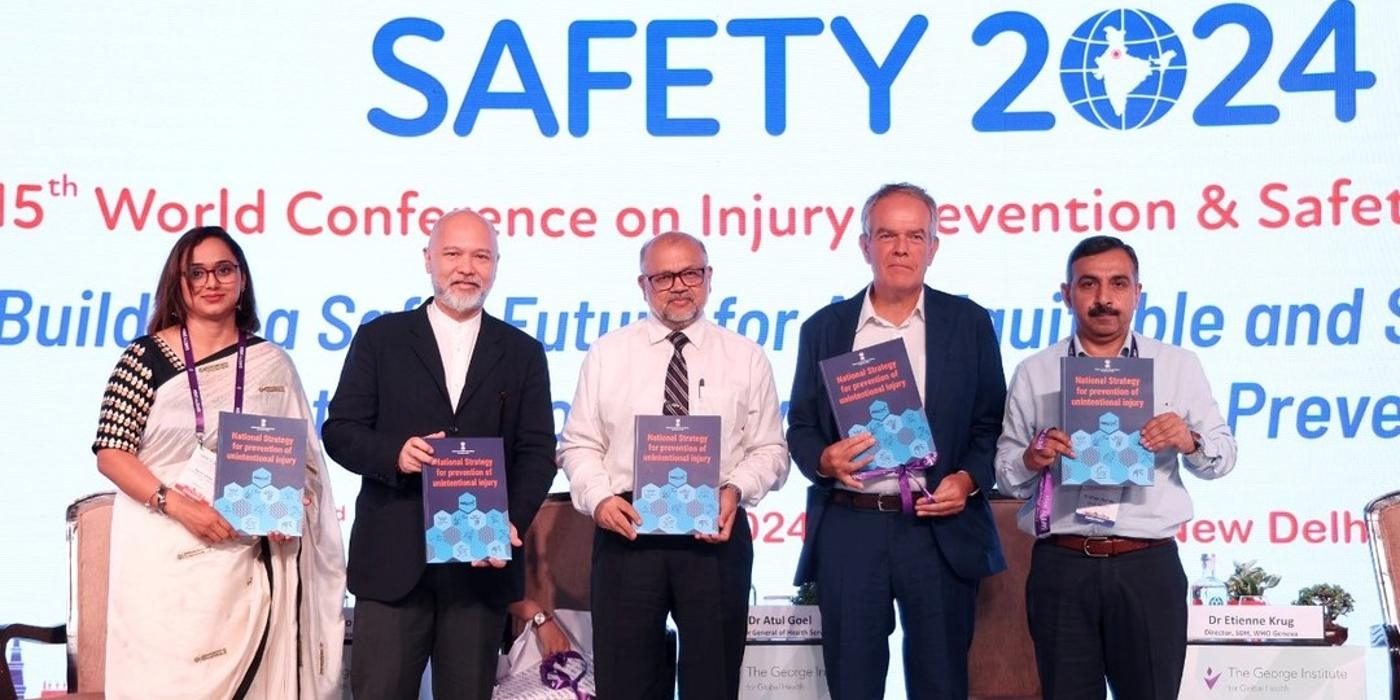
National Strategy for Prevention of Unintentional Injury Launched at Safety 2024
The 15th World Conference on Injury Prevention and Safety Promotion (Safety 2024) commenced in New Delhi yesterday, 2nd September 2024, with a significant announcement: the launch of the National Strategy for Prevention of Unintentional Injury. The comprehensive roadmap, developed in collaboration between the Ministry of Health and Family Welfare, Government of India, the World Health Organization, and The George Institute for Global Health, aims to reduce the burden of injuries in India.
The strategy prioritises four key injury mechanisms—road traffic injuries, drowning, burns, and falls from heights—and focuses on three vulnerable population groups: workers, children, and older people. It also emphasizes state-level focus, recognizing the importance of tailoring interventions to specific regional contexts.
Speaking at the launch, Prof. (Dr.) Atul Goel, Directorate General of Health Services, Ministry of Health & Family Welfare, emphasized the importance of collaboration across various sectors and levels of government. "The strategy provides technical guidance and targeted action plans, empowering diverse stakeholders to take ownership of injury prevention efforts," he said.
Safety 2024, held from September 2-4, brought together international experts to discuss strategies for reducing injury-related deaths and disabilities worldwide. Key themes included improving coordination among stakeholders, strengthening research capacity, integrating injury prevention with global health agendas, empowering communities, and promoting informed policymaking.
Dr. Tedros Adhanom Ghebreyesus, Director-General, WHO, called for controlling access to weapons, enhancing road safety, and promoting basic safety skills like swimming. "We need to control access to guns and knives, promote basic swimming skills, and ensure child safety, as well as road safety by preventing drunk driving," he said. "I call on the Safety 2024 community to come together and build a strong advocacy for safer roads and safer environments for all."
Dr. Jagnoor Jagnoor, Head, Injury Program, said, "At the 15th World Conference on Injury Prevention and Safety Promotion, we recognize that while significant strides have been made in road safety, much more remains to be done. We must shift our focus from just changing human behavior to adopting a comprehensive safe systems approach that includes safer roads and vehicles, with a strong emphasis on protecting our most vulnerable road users—pedestrians, motorised two-wheeler riders and cyclists.
Further Dr Jagnoor mentioned, “As we advance in child health, it's imperative to address preventable causes like drowning, which tragically claims many young lives. Finally, as our population ages, we cannot ignore the growing issue of falls, particularly among women. It is critical that the academic and practitioner communities prioritize prevention strategies now, before the problem escalates further."
Dr. Etienne Krug, Chair, IOC, WHO, highlighted the need for continued action to prevent road traffic deaths, falls, and violence. "The global injury and violence prevention community has made good progress in building evidence on what works to prevent road traffic deaths, falls, and violence against Children and women, among other injuries," he said. "However, injuries and violence still take the lives of around 4.4 million people every year. Much more action is needed. Safety 2024 will be a unique opportunity for our community to share the latest knowledge and experiences and generate further momentum to save lives."
Dr. Roderico H. Ofrin, WHO Representative to India, emphasized the importance of fostering collaboration to drive transformative policies. "Forster collaboration to drive transformative policies and guide policymakers to integrate injury prevention into health services, create awareness among community so we are Future Protected," he said.
Head of the Global Road Safety Facility, World Bank India, stressed the urgent need to address road traffic injuries, particularly among children and young people, as a developmental priority.
Safety 2024 features a range of sessions on topics such as gender-based violence, drowning prevention, COVID and injuries, road safety, snake bites, burn injuries and the social determinants of child injury.
Notable sessions on the inaugural day of Safety 2024 include:
"From the Margins to the Mainstream: Transforming Knowledge for Equitable Injury Prevention" explored the inequities in injury prevention and the need for systemic change to produce more inclusive and effective evidence and practices.
"Beyond Pink Helmets: Tackling Gender Bias in Injury and Violence Prevention" addressed the gender biases that compromise the safety and well-being of women and gender-diverse individuals. The session called for gender-responsive strategies to create safer and more equitable environments.
Safety 2024 continues to be a crucial platform for sharing knowledge, discussing challenges, and generating momentum to improve community safety worldwide.







